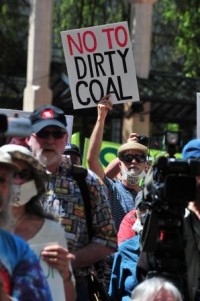Photo by Paul K. Anderson.
The Oregonian ran a large story on the public records that Columbia Riverkeeper obtained from the Port of St. Helens regarding the proposed controversial coal export terminal. In 2010 and 2011, Riverkeeper requested public records from over 20 ports in order to keep the public informed about potential coal export terminals. The Port of St. Helens refused to provide public records. After a year of litigation, Riverkeeper obtained the requested records, and the Port paid Riverkeeper’s attorney’s fees in the matter.
The Oregonian stated:
When news first leaked last year that the Port of St. Helens might be working on deals to export coal, Gov. John Kitzhaber called for "an open, vigorous public debate" before any projects moved forward.
But the port's first major step on coal didn't follow that blueprint. By the time the port went public in January, option agreements with two coal exporters had already been hammered out, records show.
Earlier that month, port commissioners met with one exporter, Kinder Morgan, on separate days to avoid a quorum that could trigger state open meetings requirements.
And commissioners approved the option agreements, months in the making, the same night the companies first presented projects publicly. The public never saw the contracts before the vote. Read the full article
One of Riverkeeper’s core principles is ensuring open government and strong public input on decisions that impact our communities. We know that people care deeply about clean water and air, and when the public is informed, out river gets protected. Our staff attorney submits dozens of public records requests each year. We review tens of thousands of documents and attend countless public hearings and meetings. When government agencies refuse to follow the law, we litigate. See Riverkeeper’s court documents in Port of St. Helens case: Combined Response/Reply.
In another example, Riverkeeper prevailed over the Federal Energy Regulatory Commission (FERC) when FERC refused to provide us with the list of landowners they notified (or failed to notify) about Liquefied Natural Gas pipelines. We wanted to ensure that all people threatened by LNG pipelines were aware they had rights. Riverkeeper set new precedent in the Freedom of Information Act caselaw by obtaining a powerful opinion that ordered FERC to provide all the records. Now and in the future, FERC cannot keep the public in the dark. See court documents: Opinion, Motion for Summary Judgement.



